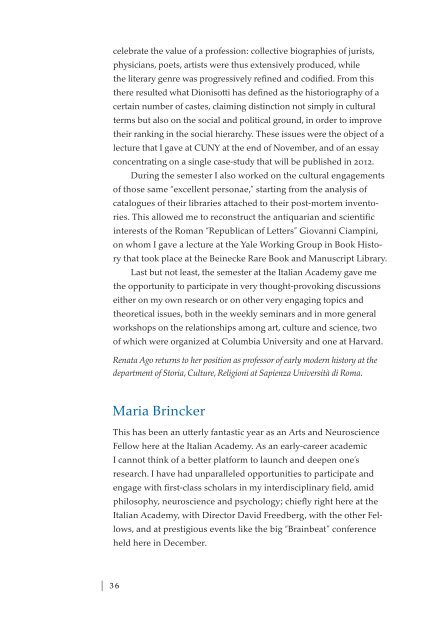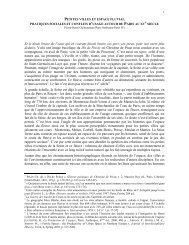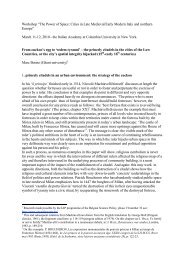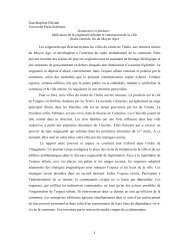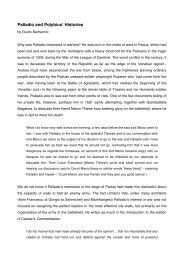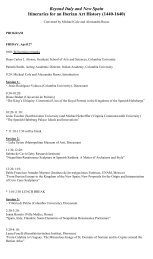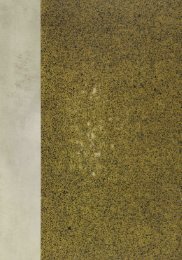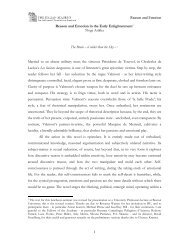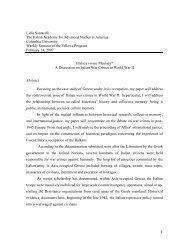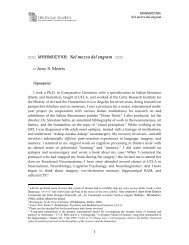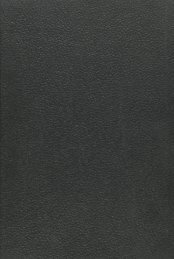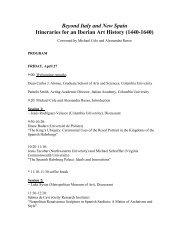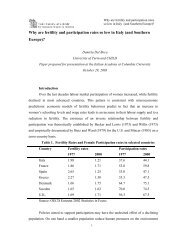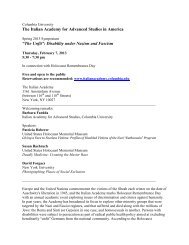2011-2012 - The Italian Academy - Columbia University
2011-2012 - The Italian Academy - Columbia University
2011-2012 - The Italian Academy - Columbia University
You also want an ePaper? Increase the reach of your titles
YUMPU automatically turns print PDFs into web optimized ePapers that Google loves.
celebrate the value of a profession: collective biographies of jurists,<br />
physicians, poets, artists were thus extensively produced, while<br />
the literary genre was progressively refined and codified. From this<br />
there resulted what Dionisotti has defined as the historiography of a<br />
certain number of castes, claiming distinction not simply in cultural<br />
terms but also on the social and political ground, in order to improve<br />
their ranking in the social hierarchy. <strong>The</strong>se issues were the object of a<br />
lecture that I gave at CUNY at the end of November, and of an essay<br />
concentrating on a single case-study that will be published in <strong>2012</strong>.<br />
During the semester I also worked on the cultural engagements<br />
of those same “excellent personae,” starting from the analysis of<br />
catalogues of their libraries attached to their post-mortem inventories.<br />
This allowed me to reconstruct the antiquarian and scientific<br />
interests of the Roman “Republican of Letters” Giovanni Ciampini,<br />
on whom I gave a lecture at the Yale Working Group in Book History<br />
that took place at the Beinecke Rare Book and Manuscript Library.<br />
Last but not least, the semester at the <strong>Italian</strong> <strong>Academy</strong> gave me<br />
the opportunity to participate in very thought-provoking discussions<br />
either on my own research or on other very engaging topics and<br />
theoretical issues, both in the weekly seminars and in more general<br />
workshops on the relationships among art, culture and science, two<br />
of which were organized at <strong>Columbia</strong> <strong>University</strong> and one at Harvard.<br />
Renata Ago returns to her position as professor of early modern history at the<br />
department of Storia, Culture, Religioni at Sapienza Università di Roma.<br />
Maria Brincker<br />
This has been an utterly fantastic year as an Arts and Neuroscience<br />
Fellow here at the <strong>Italian</strong> <strong>Academy</strong>. As an early-career academic<br />
I cannot think of a better platform to launch and deepen one’s<br />
research. I have had unparalleled opportunities to participate and<br />
engage with first-class scholars in my interdisciplinary field, amid<br />
philosophy, neuroscience and psychology; chiefly right here at the<br />
<strong>Italian</strong> <strong>Academy</strong>, with Director David Freedberg, with the other Fellows,<br />
and at prestigious events like the big “Brainbeat” conference<br />
held here in December.<br />
| 36


